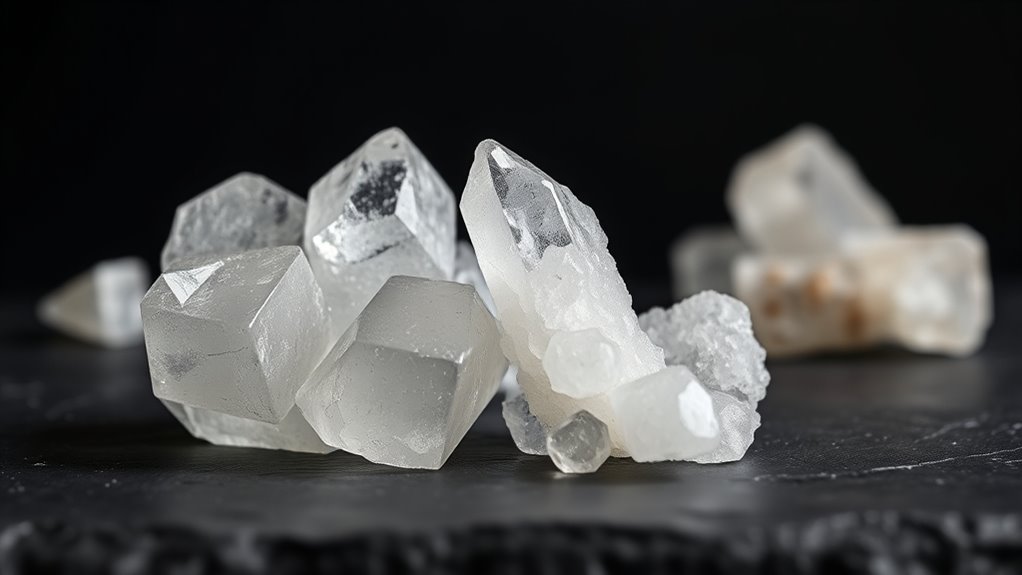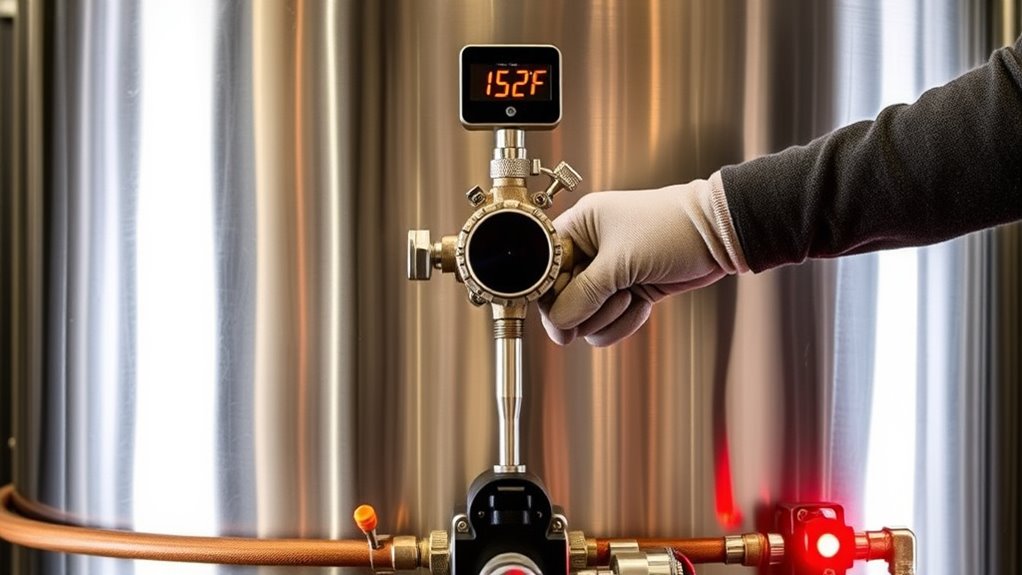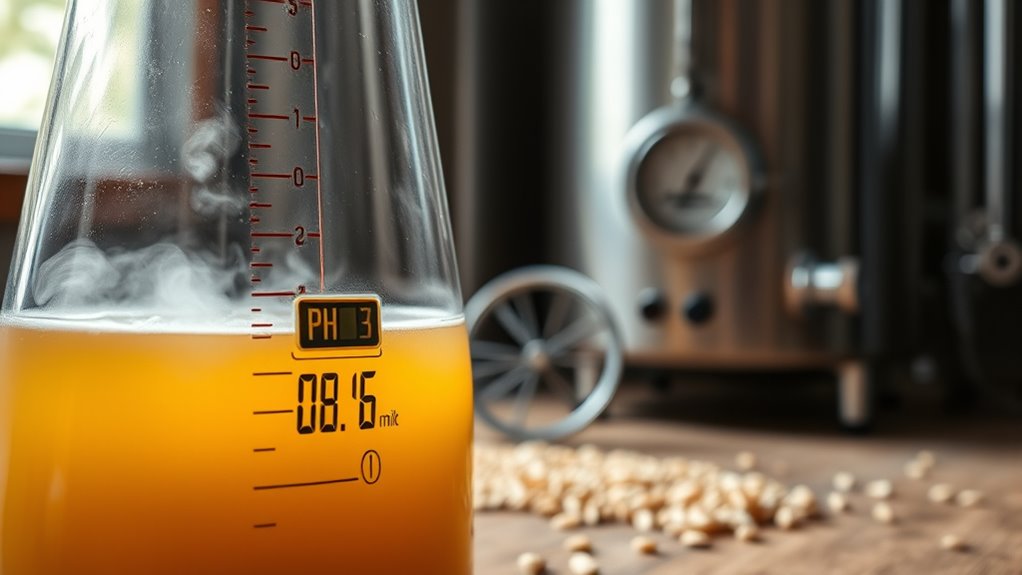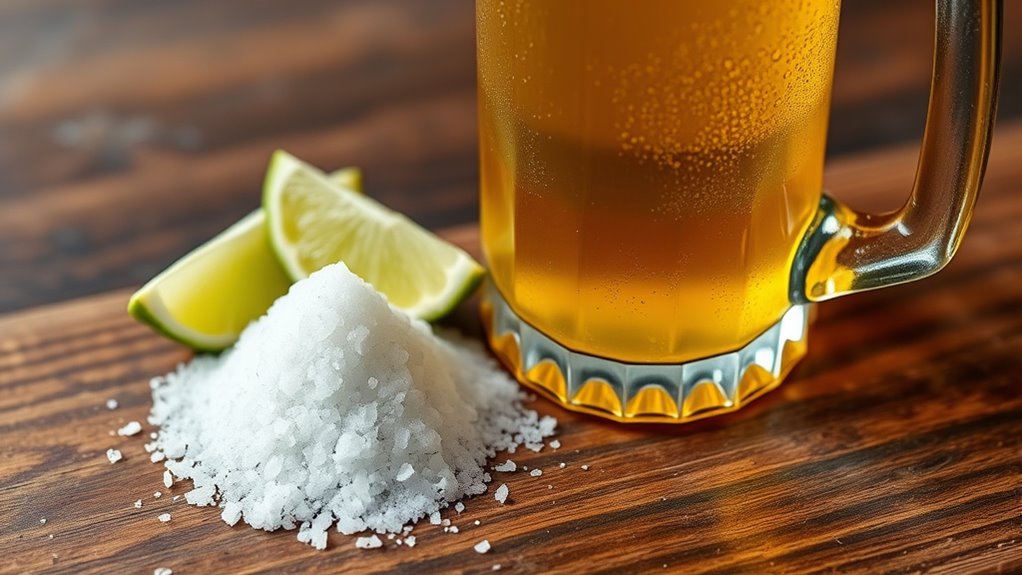Calcium chloride and gypsum serve different purposes in brewing. Calcium chloride enhances malt sweetness and body, making it suitable for malt-forward beers like ESBs. In contrast, gypsum accentuates hop bitterness and dryness, ideal for hop-forward styles such as Pilsners. It’s essential to balance these salts to achieve the desired flavor profile. Helpful Hint: Use gypsum for hoppy brews and calcium chloride for maltier ones. Understanding their roles can greatly improve your brewing process and beer quality.
At a Glance
- Calcium Chloride enhances malt sweetness and body, making it ideal for malt-forward beers like ESBs.
- Gypsum accentuates hop bitterness and dryness, perfect for hop-forward styles like Pilsners.
- The sulfate-to-chloride ratio is crucial; higher sulfate levels enhance hop character, while chloride-rich profiles enrich malt complexity.
- Both salts aid in mash pH adjustment but serve different flavor profiles; Calcium Chloride lowers pH while Gypsum raises sulfate levels.
- Calcium Chloride improves yeast flocculation and fermentation efficiency, whereas Gypsum optimizes enzyme function and yeast activity.
Understanding Calcium Chloride and Gypsum
When brewing beer, the choice of water additives can greatly impact the flavor and mouthfeel of your final product. Understanding Calcium Chloride and Gypsum is essential for achieving your desired results.
Calcium Chloride enhances malt sweetness and creates a fuller mouthfeel, ideal for malt-forward beers like ESBs. In contrast, Gypsum accentuates hop bitterness and dryness, making it perfect for hop-forward styles like Pilsners.
Remember, Gypsum lowers mash pH, while Calcium Chloride softens it. Use these additives thoughtfully, as excess can lead to overpowering mineral flavors.
Helpful Hints:
- Aim for 150-300 ppm sulfate with Gypsum.
- Target 40-100 ppm chloride with Calcium Chloride.
Effects on Beer Flavor Profiles
Understanding how Calcium Chloride and Gypsum affect beer flavor profiles is vital for brewers aiming to refine their craft.
Calcium chloride enhances malt sweetness and body, making it perfect for malt-forward styles like ESBs. In contrast, gypsum accentuates hop bitterness and dryness, ideal for hoppy beers like IPAs.
Adjusting the sulfate-to-chloride ratio is essential; a higher sulfate level boosts hop character, while a chloride-heavy profile enriches malt complexity.
Remember, excessive gypsum can lead to overly minerally flavors, so balance is key. Small salt adjustments can create significant differences in flavor perception, impacting your final beer character dramatically.
Helpful Hints:
- Use calcium chloride for malt-forward beers.
- Opt for gypsum in hoppy styles.
- Monitor sulfate-to-chloride ratios.
Role in Mash Ph Adjustment
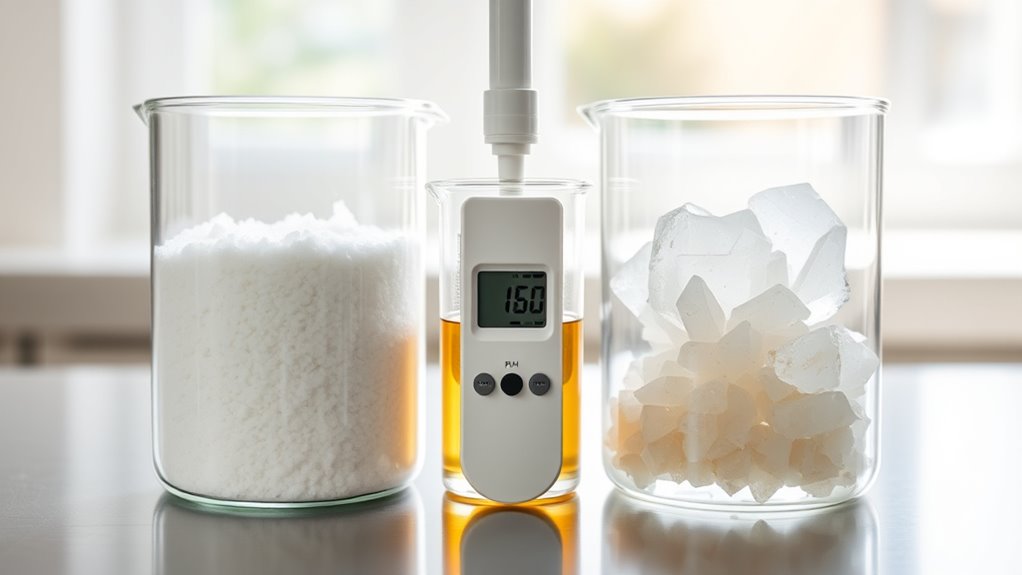
Adjusting the mash pH is essential for brewing, as it directly influences the flavor and overall quality of the beer.
Utilizing calcium chloride or gypsum can help you achieve the desired pH range of 5.3 to 5.5. Here are some helpful hints:
- Calcium chloride lowers mash pH, enhancing malt sweetness, ideal for malt-forward styles.
- Gypsum also lowers pH but raises sulfate levels, promoting a crisp finish, perfect for hop-forward beers.
- Excessive use of either can lead to unbalanced flavors, so measure carefully.
- Always consider your water composition for effective pH adjustment.
Additionally, maintaining a mash pH within the optimal range is critical for enzyme activity that converts starches to fermentable sugars.
Recommended Usage by Beer Style
Choosing the right mineral additions, like gypsum and calcium chloride, can greatly impact your beer’s flavor profile.
Selecting appropriate mineral additions such as gypsum and calcium chloride is essential for enhancing your beer’s flavor profile.
1. Hop-Forward Beers****
For styles like Pilsners and IPAs, use gypsum. It enhances hop bitterness and creates a drier finish.
2. Maltier Beers****
If you’re brewing ESBs or Brown Ales, calcium chloride is your go-to. It promotes a fuller mouthfeel and boosts malt sweetness.
3. Darker Brews****
For darker beers, consider alternatives like chalk or baking soda, as gypsum and calcium chloride mightn’t work well.
Helpful Hint:
Experiment with both salts to find the perfect balance for your desired flavor profile.
Impacts on Fermentation and Yeast Health
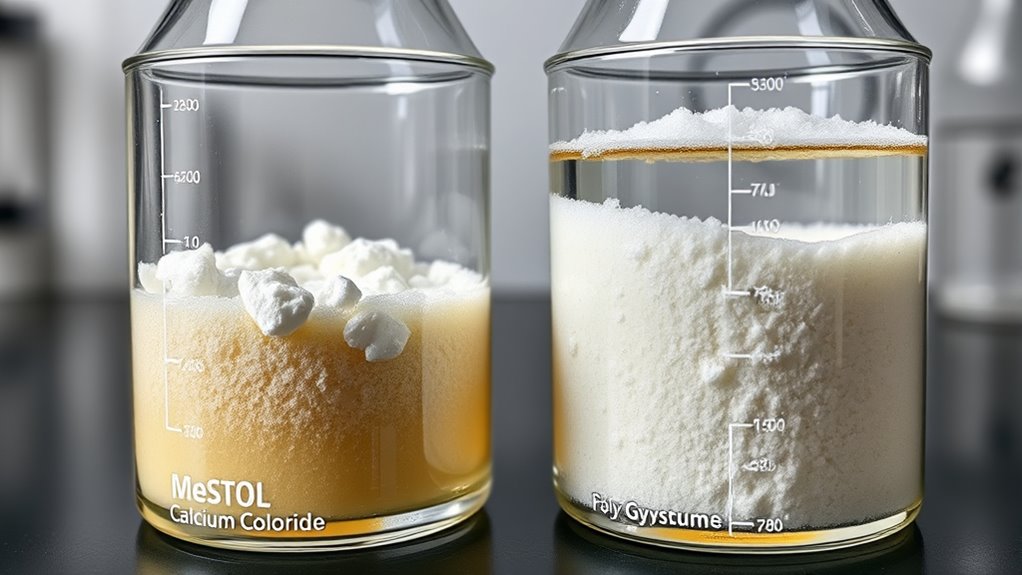
When brewing beer, the choice of mineral additions like calcium chloride and gypsum plays a significant role in fermentation and yeast health.
Here are some key impacts to evaluate:
- Calcium Chloride enhances yeast flocculation and fermentation efficiency, promoting overall yeast health.
- Gypsum lowers mash pH, optimizing enzyme function and improving yeast activity.
- Both salts aid in protein precipitation, leading to clearer beer.
- High calcium levels prevent off-flavors but require careful measurement to avoid harshness.
Understanding these factors enables you to create a more hospitable environment for yeast, ultimately enhancing your brewing experience.
Water Chemistry Considerations
Water chemistry plays a crucial role in brewing beer, as it directly influences flavor, mouthfeel, and overall quality.
When choosing between Calcium Chloride and Gypsum, consider their unique effects. Calcium Chloride enhances malt sweetness, making it ideal for malt-forward styles. In contrast, Gypsum accentuates hop bitterness, best for hop-centric beers.
It’s important to monitor your water’s mineral content, as excessive salts can create imbalanced flavors. Aim for a Chloride range of 40-100 ppm and a Sulfate range of 30-70 ppm for balanced ales. Additionally, using cost-effective bulk purchases of base malt can help you manage your brewing expenses while ensuring quality.
Understanding these factors will help you craft innovative and flavorful brews.
Helpful Hints:
- Test your water before adding salts.
- Adjust your SO4:Cl ratio based on beer style.
Practical Tips for Adding Salts
Adding salts to your brewing process can greatly impact the flavor profile of your beer, so it’s essential to do it correctly.
Here are some helpful tips:
- For calcium chloride, aim for 40-100 ppm to enhance malt sweetness in styles like Brown Ales.
- Use gypsum at 30-70 ppm to boost hop bitterness, perfect for pale ales.
- Add salts directly to the mash for effective pH adjustments.
- Always measure salts accurately with a scale, starting small to avoid overwhelming flavors.
Before making any water adjustments, assess your water profile to guarantee your additions align with your desired beer style.
Balancing Calcium Chloride and Gypsum in Brewing
Understanding how to balance Calcium Chloride and Gypsum can greatly influence the outcome of your beer. When brewing, consider the flavor profile you want. Use Calcium Chloride for maltier beers like ESBs and Gypsum for hop-forward styles like Pilsners.
Balancing Calcium Chloride and Gypsum is essential for achieving your desired beer flavor profile.
A common ratio for IPAs is 2:1 sulfate to chloride, promoting a crisp mouthfeel. Remember, excessive Gypsum can lead to harsh flavors, so balancing is key.
For darker beers, you might need alternatives, such as chalk, to raise mash pH. Always measure salts accurately, starting with lower amounts to avoid overpowering your beer’s final flavor.
Helpful Hints:
- Test small amounts first.
- Adjust based on style preference.
